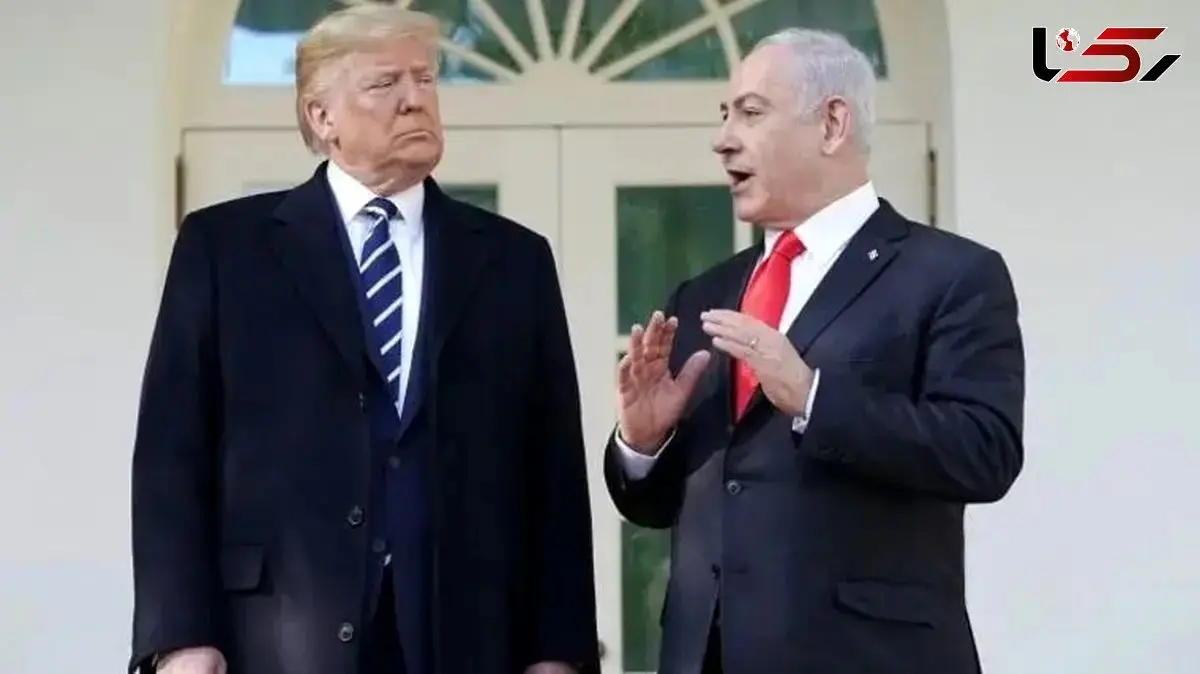Enmity in Appearance, Partnership in Reality: The Enigma of Trump-Israel Relations
Behind Trump and Israel’s Dispute: What Agreement Is in Play?
Rokna Political Desk: The apparent disagreements between Trump and Israel over the West Bank annexation plan conceal a hidden political coordination that facilitates settlement expansion and advances the “Greater Israel” project. Through tactical maneuvers, Trump seeks to maintain relations with Arab states and project the image of a “peace champion.”

Ehsan Al-Faqih, Senior Middle East Analyst, Al-Quds Al-Arabi
According to Rokna, citing Al-Quds Al-Arabi, as Gaza cautiously begins to recover and rebuild after two years of Israel’s devastating war, Trump’s plan to halt the conflicts remains on the edge of a crisis. Israel, following its longstanding practice, escalated tensions once again. Last Wednesday, the Israeli parliament (Knesset) approved two legislative bills for the annexation of the West Bank, sparking global anger and concern.
This vote coincided with the visit of U.S. Vice President J.D. Vance to the occupied territories. Vance described the visit as “insulting” and criticized the Israeli lawmakers’ action as a “foolish political maneuver” that could jeopardize diplomatic efforts. The reactions, both domestically and internationally, were sharp and highly controversial. The conflicting and even opposing positions of political and diplomatic figures underscore a new level of tension regarding the future of the occupied territories, making analysis imperative.
Meanwhile, U.S. President Donald Trump stated in an interview with Time magazine that the West Bank annexation plan would not be implemented. He emphasized that he had promised Arab leaders on the matter and warned that if Israel proceeded, it would “lose Washington’s support.”
A New Rift in the Right Wing: Trump’s Shift and Tel Aviv’s Anger
The unexpected statement by the U.S. president opposing the West Bank annexation marks a clear shift from his earlier campaign positions, when he controversially and openly stated that “Israel deserves to expand its territory,” which at the time was seen as explicit support for annexation. Furthermore, during that period, he had made firm promises to some of his campaign’s powerful financial backers, including the influential Israeli-American billionaire Miriam Adelson, to advance the annexation plan.
Within Israel, the far-right faction reacted angrily to Trump’s recent remarks. Itamar Ben-Gvir, Israel’s Minister of National Security, strongly rejected the U.S. president’s stance, stating: “Israel is a sovereign country and is not under the tutelage of any country, including the United States.” This latest position came just days after Ben-Gvir had also criticized Trump regarding his comments about the possible release of Palestinian prisoner Marwan Barghouti.
Meanwhile, Bezalel Smotrich, Israel’s far-right Finance Minister, expressed a softer but hopeful tone, asserting that Trump would eventually change his position. He wrote: “I am confident that, as we have seen in the case of the prisoners, the president will alter his view once he understands the importance of Israeli sovereignty over Judea and Samaria,” referring to the West Bank, the main focus of the current dispute.
The “Greater Israel” Dream and New Duality in Tel Aviv
Amid broad disagreements within Israel regarding the West Bank annexation, Benjamin Netanyahu, unlike his far-right allies, adopted a softer tone and sent a reassuring message to the U.S. president. He emphasized that he had no intention of implementing the annexation plan and attributed the controversial recent Knesset vote to the opposition, calling it a “deliberate political provocation” aimed at disrupting the political atmosphere during the U.S. vice president’s visit. Netanyahu’s recent stance contrasts with his past, as he had repeatedly and publicly stressed the necessity of annexation.
This divergence from past positions and Trump’s recent shift raises new questions: Has Israel’s prime minister truly abandoned the vision of complete control over the West Bank? Has Trump, who once claimed unconditional support for Israel, now retreated from this stance? The answer appears clear: Israeli leaders neither today nor in the future will relinquish their long-standing goal of annexing the West Bank and all Palestinian land. The Israeli government’s foundation is not built on coexistence or territorial division but on the “complete replacement” of the Palestinian people by the Jewish nation, a project defined within the broader “Greater Israel” plan from its inception.
Netanyahu’s Dual Game in Annexation: Patience Until the Right Moment
Despite contradictions, Benjamin Netanyahu remains the experienced politician and master of complex maneuvers, with a strategy for each day and historical moment. He understands that raising the annexation issue in the current tense atmosphere is politically incompatible and could put the United States in a difficult position, particularly after Donald Trump assumed a leadership role in the so-called “Middle East peace process,” presenting himself as a “peace hero.” While this process is based on a “two-state solution,” annexing the West Bank would undoubtedly undermine it fundamentally.
It seems that the current political scene in Israel reflects a purposeful division of roles between annexation supporters and opponents. Netanyahu’s seemingly opposing stance aligns him tactically with U.S. positions, the Arab world, and the international community—a necessity in this sensitive period. Meanwhile, extreme annexation advocates, by repeating slogans and stirring political sentiment, keep the issue alive in Israeli society and global public opinion until conditions allow Netanyahu to implement the original plan.
Creeping Annexation and the Illusion of American Peace
On the ground, Israel has never abandoned its annexation ambitions. The reality is that Israel began gradually implementing the plan long ago and, since 2022, with the rise of far-right ministers, has accelerated this process. This has been confirmed in a recent International Crisis Group report titled “Unnamed Sovereignty: Israel Accelerates West Bank Annexation,” clearly showing that the annexation dream is neither halted nor forgotten.
Currently, Israel’s settlement expansion in the West Bank continues at a noticeable pace. Palestinians are gradually being displaced and confined to isolated areas under direct military control. Simultaneously, Israel has transferred significant authority in these areas from the military to civilian Israeli institutions to consolidate control. Field reports and international documentation indicate that Israel has effectively begun the West Bank annexation.
Trump’s new stance should not be interpreted as a real withdrawal of support for Israel. His threat to cut aid if annexation proceeds is primarily a political tactic rather than a strategic shift. The U.S.-Israel relationship extends beyond a standard partnership. Trump’s political survival depends on satisfying two main pillars: first, the influential evangelical community, staunchly pro-Israel, forming a substantial part of his voter base; second, the influence of the Zionist lobby and the U.S. “deep state,” which impacts decision-making at multiple levels.
Thus, Trump’s apparent opposition to annexation is a calculated maneuver to preserve his achievements in halting the Gaza war and repairing his image with American and global public opinion. He does not want to jeopardize relations with Arab states that have presented a unified message on the necessity of a two-state solution. In short, the issue revolves around timing and tactics: Trump is playing with time, Netanyahu moves in coordination with him, and Israel’s right-wing faction keeps the annexation debate alive, while the world continues to cling to the illusion of an “American solution” for Middle East peace.

Send Comments